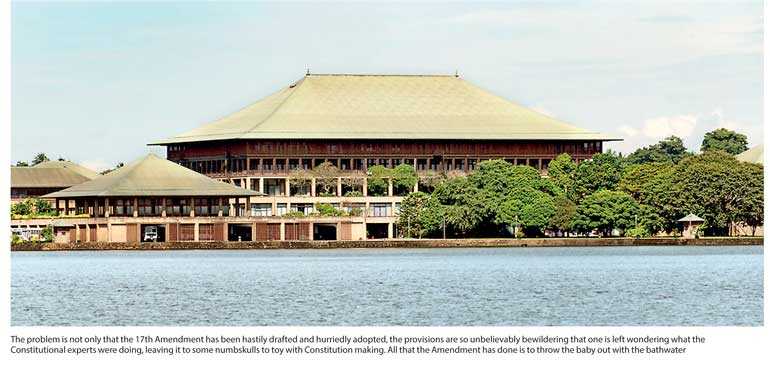Friday Feb 20, 2026
Friday Feb 20, 2026
Friday, 13 July 2018 00:00 - - {{hitsCtrl.values.hits}}
 By Tassie Seneviratne
By Tassie Seneviratne
Having made a study of the thesis titled ‘Viewpoint on the 17th Amendment’ by Dr. Frank de Silva, former Inspector General of Police, and gleaning from other sources too, I find the following information to be of vital importance to all Sri Lankans.
De-politicisation of the public service wholesale has been the outcome of the Amendment. Political interference leading to miscarriage of justice has been the only aspect taken into consideration when drafting the Amendment, but has been oblivious to the numerous inherent and intricate facets of political involvement vital to representative democracy. The absence of political control, political direction and political oversight over the public service has led to far worse consequences.
The amendment provides only for the appointments of the Constitutional Council (CC) and National Independent Commissions (NIC). The functions of the NICs are limited to the exercise of administrative authority by way of appointments, promotions and punishments. The NICs do not hold themselves accountable for performance! The accountability for performance is thereby nobody’s baby. Little wonder that the Police as the premier law enforcement agency is in such disarray.
This aspect was widely exposed in the media at the very start of the working of the National Police Commission (NPC), when Ranjith Abeyasuriya was its Chairman and John Amaratunga was Minister of Law and Order. At a media briefing, Minister of Law and Order Amaratunga was asked about the deteriorating law and order situation. His response was: “Ask the Chairman NPC.” When they asked the Chairman NPC, his prompt reply was: “Ask the Minister”. So it was a matter of passing the buck with no difference to date. Too many cooks spoiling the soup is the order of the day.
The selection of members to the NPC is all of good men, but not conversant to make appraisals on performance, even if they try to do it. Neither is the NPC provided with the wherewithal to do so, nor is it asking for it. Looks like they are quite happy warming their chairs! The already beleaguered people have to pay for all this.
One way the existence of the NPC is brought to the notice of the public is a sign board at the back of the official car used by its Chairman, reading ‘National Police Commission’. I do not know what purpose it serves other than the Police on duty facilitating its smooth movement and convenient parking, with salutes.
Politics is essential to representative democracy. It is the representative principle that pursues performance, responsibility and accountability after the initial appointment. This Amendment as it stands, has done away with that responsibility and accountability. As a result the representative principle has been substituted by unelected-non representative action from which flow a myriad subversions that can be attributed to an insidious development within the Government machinery.
There is manipulation and appropriation of the process through corruption and abuse of power under the malign influence of narcotics and dangerous drugs trade, alcohol business, patronage, underworld forces and by other cartel arrangements. These aspects outline the dangerous facet of the problem in regard to performance – a trend which eats into the entrails of the whole Government structure – a far cry from representative democracy.
The substitutes for elected representatives are as remote from people as the automatic teller machines (ATM) are from holders of ATM cards (though not as reliable for the outcome!). There is no personal relationship whatsoever after the transaction.
In contrast, and as pointed out in an earlier article by me, the Member of Parliament (MP) during the time when elections were held constituency-wise, was too close to the constituents that he could not afford to demand bribes from them for services rendered because his fate was in their hands. His survival therefore depended on his performance, whereas the 1978 Constitution made way for authoritarian governance.
The problem is not only that the 17th Amendment has been hastily drafted and hurriedly adopted, the provisions are so unbelievably bewildering that one is left wondering what the Constitutional experts were doing, leaving it to some numbskulls to toy with Constitution making. All that the Amendment has done is to throw the baby out with the bathwater.
It is high time we return to representative democracy that we are professed to be, notwithstanding party leaders who would revel in authoritarian governance.